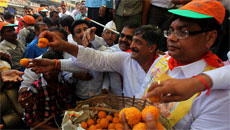"The visit of Guru Nanak Devji in 1510-11 A.D. to have darshan of Lord Ram's birthplace does support the faith and belief of the Hindus," said the anonymous judge who believed that faith of the Hindus was important.
In what will go down in history as one of its most landmark verdicts, the Supreme Court on Saturday granted the ownership of the 2.77 acres of disputed land in Ayodhya to the Hindus, paving the way for the construction of a Ram Temple, and ruled that the Muslims will get 5 acres of land at an alternative site.
This anonymous judge on the Ayodhya bench has offered a separate perspective on Lord Ram's birth. Though the judgement does not name the judge, his observations have been included as addendum.
The apex court observed that it was true that from the extracts of 'Janam Sakhis' -- the writings which profess to be biographies of Guru Nanak Dev which have been brought on record for the Ayodhya title dispute case -- there was no material to identify the exact place of Ram Janmabhoomi, but the visit of Guru Nanak Dev to Ayodhya was an event, which depicted that pilgrims were visiting Ayodhya for the darshan of Lord Ram's birthplace even before 1528 A.D.
During cross-examination, a witness identified as Rajinder Singh with an interest in reading religious, cultural and historical books of the Sikh cult referred to several books about Sikhism and history. He said that Guru Nanak Dev had sought darshan of Lord Ram's birthplace in Ayodhya.
The judge held that the faith and belief of Hindus about the location of Lord Ram's birthplace stemmed from religious scriptures and sacred books, including the Ramayana and Skanda Purana.
"Thus, it is found that in the period prior to 1528 A.D., there was sufficient religious texts, which led the Hindus to believe the present site of Ram Janmabhoomi as the birthplace of Lord Ram," said the anonymous judge.
The judge also cited Tulsidas in Bal Kaand, where he had composed verses, which were spoken through Lord Vishnu. The verses say that when Brahma appealed to Vishnu to relieve the 'devas', sages, 'Gandharvas' and earth from the terror of Ravana, Lord Vishnu said that "I will take human form and be born to Dasaratha and Kausalya in Kosalapuri.
"Chaupaiyas (verses) does not only refer to Vishnu taking the human form in Avadhpuri, i.e., Ayodhya, but the verse also specifically mentions that he will take human form at the house of Dasaratha and Kausalya," said the judge.
The SC judgement said, "One of us, while being in agreement with the above reasons and directions, has recorded separate reasons on whether the disputed structure is the birthplace of Lord Ram according to the faith and belief of the Hindu devotees. The reasons of the learned judge are set out in an addendum."
